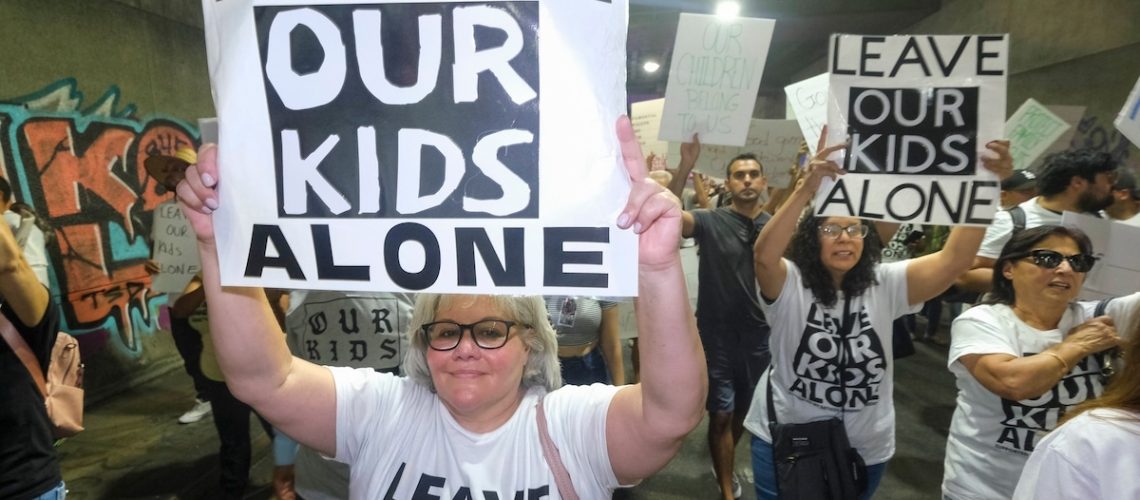Canada recently witnessed widespread protests and counter-protests across several cities, including Vancouver, Toronto, and Kelowna, as citizens debated LGBTQ-inclusive sex education in schools. The “1 Million March 4 Children” protests, led by conservative groups, opposed the inclusion of LGBTQ+ topics in school curriculums, arguing it “indoctrinates” children with ideas they are too young to understand. In contrast, LGBTQ+ advocates rallied to support these curriculums, emphasizing the importance of inclusive education for creating safe, supportive environments for all students, particularly LGBTQ+ youth.
Background on the Controversy
The debate over LGBTQ-inclusive education is not new, but it has gained significant traction in recent years, particularly as more Canadian provinces adopt curricula that include topics like gender identity, sexual orientation, and same-sex relationships. The protests follow the implementation of educational programs like SOGI 123 (Sexual Orientation and Gender Identity), which are designed to help teachers create inclusive classrooms and reduce bullying. However, critics argue that these programs introduce concepts that children are too young to process, leading to strong opposition in more conservative areas of the country.
Thin Turnout in 2024 Compared to Previous Years
In 2024, the protests saw a much thinner turnout compared to the larger demonstrations of previous years. For example, in Vancouver, the number of anti-LGBTQ protestors was significantly lower, with only a few dozen people attending the rallies. Kelowna also saw minimal participation from those opposed to LGBTQ-inclusive education, though LGBTQ+ advocates and supporters gathered to counter-protest and promote inclusivity.
“Children’s minds are still forming at such a young age. We believe they cannot comprehend what is being instructed to them,” said Graeme Flannigan, a protester in Kelowna. This sentiment was echoed by many who participated in the protests, with concerns focused on the age-appropriateness of the material.
However, LGBTQ+ advocates argue that these educational programs are essential to create a supportive and respectful environment for all students, particularly LGBTQ+ youth who are often marginalized. Wilbur Turner, president of Advocacy Canada, emphasized that LGBTQ-inclusive education plays a vital role in reducing bullying and fostering understanding. “These programs ensure that LGBTQ+ students feel safe and respected in their schools,” he said, noting the high rates of bullying and mental health struggles faced by LGBTQ+ youth.
Regional Political Divides
The protests have highlighted regional political divides in Canada. In provinces like Alberta and Ontario, where conservative governments have taken steps to restrict or review educational content related to gender and sexual identity, the issue has become particularly contentious. Alberta Premier Danielle Smith, for example, has been a vocal critic of SOGI 123 and other inclusive education programs, arguing that parents should have the final say on whether their children are exposed to such topics in school.
In contrast, provinces like British Columbia have been more supportive of inclusive education, with the provincial government defending the inclusion of LGBTQ+ content in schools. B.C. Education Minister Rachna Singh stated, “Our schools must be safe and welcoming for all students, regardless of their gender identity or sexual orientation. These programs are about teaching respect and understanding, not indoctrination.”
Ongoing Tensions
While the 2024 protests may have seen lower turnout, the underlying tensions remain. The inclusion of LGBTQ+ topics in sex education curriculums has become a flashpoint in the broader cultural and political battle over LGBTQ+ rights in Canada. For conservative groups, the issue touches on parental rights, religious freedom, and what they see as the overreach of government into personal values and beliefs. For LGBTQ+ advocates and allies, it is about ensuring that all students—regardless of their gender or sexual identity—feel safe, respected, and understood in their learning environments.
In 2023, similar protests saw much larger crowds, with heated debates taking place in front of the Vancouver Art Gallery and in other major cities. At the time, tensions grew so intense in some areas that police were called in to de-escalate confrontations between protestors and counter-protestors. While the physical turnout may have dwindled in 2024, the emotional and political stakes remain high, with both sides showing no signs of backing down.
The Future of LGBTQ-Inclusive Education
As Canada continues to grapple with this divisive issue, it’s clear that the future of LGBTQ-inclusive education will remain a central point of debate in the country’s political and cultural landscape. With conservative provinces pushing back against these educational reforms, and LGBTQ+ advocates calling for greater inclusion, the discussion around sex education and LGBTQ+ issues is far from settled.
For now, both sides continue to make their voices heard, as the broader debate over the role of gender and sexual identity in Canadian education shows no sign of fading. The question remains: How will schools navigate this divide while ensuring that all students feel respected, safe, and included?
21 Beliefs About the Bible That Are Actually False

The Bible is one of the most discussed and debated books in history, yet many common beliefs about it are more myth than fact. How many of these misconceptions have you heard before? 21 Beliefs About the Bible That Are Actually False
21 Subtle Racisms That Are Commonplace in America

Racism in America isn’t always overt; it often hides in plain sight through subtle actions and attitudes. How many of these subtle racisms have you noticed around you? 21 Subtle Racisms That Are Commonplace in America
Featured Image Credit: Shutterstock /Ringo Chiu.
This post first appeared on Pulse of Pride.

